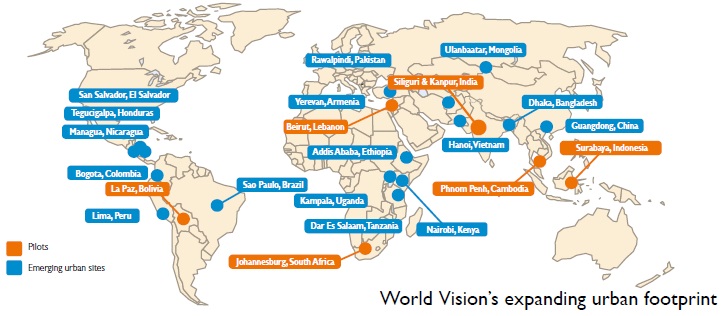Our Urban Evidence Base
In 2008, recognizing an organizational need to respond and adapt to the growing trend of urbanization, and its negative impact on the most vulnerable groups, especially children, World Vision launched an action-research and learning approach to investigate the relevance of its current development models and frameworks in urban settings.
The lessons from this first phase of action research are informing effective and innovative ways to tell the complex story regarding World Vision's impact in dense and diverse informal settlements and slums. City strategies are recommended to ensure World Vision's investment in programming and policy leads to sustainable change for marginalized urban communities. World Vision proposes Just Cities for Children that are healthy, safe, resilient and prosperous where children thrive.
The learnings from this first phase is documented in the report 'Making Sense of the City'.
The Urban Research Initiative
World Vision is one of the largest INGOs focused on child well-being with a reach of more than 4.3 million children across 90 countries. We are already present in the world’s most rapidly urbanising countries and regions. However, the urbanisation of poverty has presented NGOs like us with largely unexplored territory. To date the organisation has focused predominately on rural communities, with only an estimated 20% of programming in urban or peri-urban communities, while the world is already more than 50% urban.
In 2008, the urban research initiative was launched in collaboration with six field offices involving all stakeholders, including communities, in a reflective process to learn about the unique characteristics and complexities in mega-cities, medium, secondary and small cities.
This first phase of urban research confirms that children are the first casualties of urban poverty – often living on the streets, without adequate shelter and support, exposed to violence, are exploited for drugs, sexual violence and prostitution. The organisation acknowledges that children living in slums remain especially vulnerable to human rights violations associated with slum environments resulting in adverse health, educational, social, economic and environmental outcomes. There is emerging evidence to say that loss to positive childhood is loss of human capacity to be economic and socially responsible citizens of their communities and nations.
We are learning that proximity to services in urban settings does not mean access and the urban poor continue to be excluded from the benefits of urbanisation due to political social and economic factors. The research initiative explored adaptations to World Vision’s current portfolio of development theories and frameworks and application of these across dynamic contexts. City strategies are recommended to ensure World Vision’s investment in programming and policy leads to sustainable change for marginalised urban poor communities.
Organisations such as World Vision and other civil society actors aspire to see a fair and equitable world in implentation of the New Urban Agenda, adopted at the United Nations Habitat III Conference. World Vision proposes 'Just Cities for Children' that are safe, resilient, prosperous and healthy where the children and youth thrive, especially the most vulnerable.
Our argument is that the younger generation, when given the appropriate space and tools, are able to actively advocate for their right to playgrounds, green and clean spaces for better quality of life, street lights for safety, equity and social inclusion to ensure peaceful neighbourhoods in the city. Read Just Cities for Children - Voices from Urban Slums.
Community-driven solutions that include children’s voices in planning safe and healthy spaces for children can change the perception of children’s role in shaping liveable and just cities - a role which has traditionally been non-existent. To ensure sustainable urbanisation, governments need to frame institutional and legal frameworks that enable participation and consultation of youth and children in decision-making processes targeting human settlement strategies, policies and programmes.
Find out more information in our report 'Making Sense of the City'.
We also have a series of case studies highlighting our work in Bangladesh, Cambodia, Honduras, India, Lebanon, and the Philippines.
